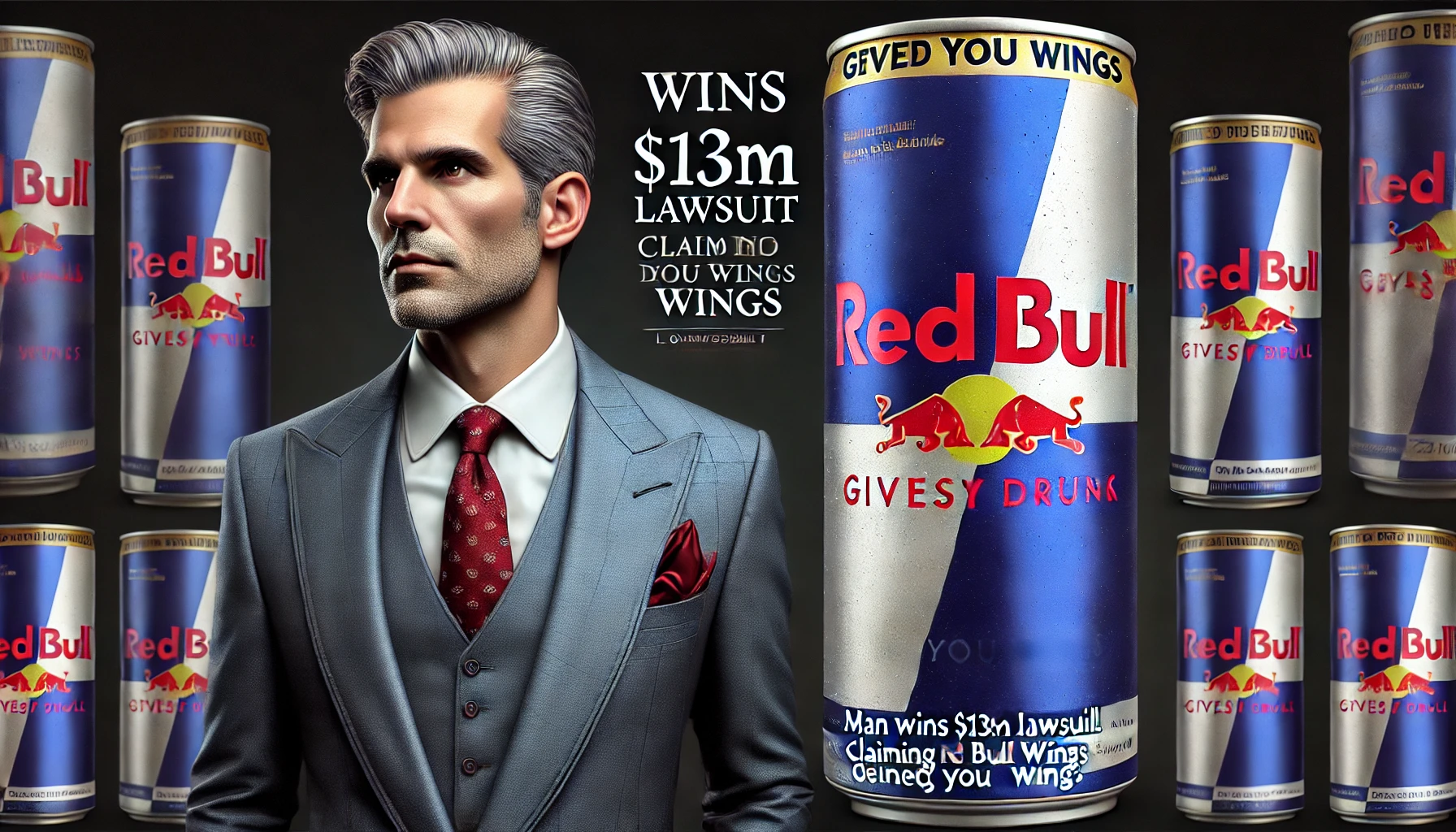Red Bull Gives You Wings Lawsuit: Legal Implications, Consumer Impact, and Company Response

The Red Bull Gives You Wings lawsuit was initiated in 2014 when consumers filed a class-action suit against the energy drink giant, claiming that the slogan “Red Bull gives you wings” was misleading. Plaintiffs argued that the slogan falsely implied that drinking Red Bull would provide enhanced physical or mental capabilities, despite no scientific proof supporting such claims.
The lawsuit focused on how advertising influenced consumer behavior. Red Bull had positioned itself as an energy-boosting drink, using the slogan to build brand loyalty and market dominance. However, the lack of substantiation for its claims led to legal challenges questioning the truthfulness of its messaging.
This lawsuit became widely known as a pivotal case in false advertising, raising concerns about the responsibility companies have when making promotional claims that exaggerate the benefits of their products.
The Claims Behind the Red Bull Gives You Wings Lawsuit
The core of the lawsuit revolved around the allegations that Red Bull’s famous slogan was misleading and that the company used exaggerated marketing tactics. Plaintiffs claimed that Red Bull did not deliver on its promise of enhanced performance, as there was no scientific evidence proving that it improved physical or mental abilities beyond what could be expected from caffeine alone.
The lawsuit also argued that the average consumer would interpret the “gives you wings” slogan as implying tangible benefits. Consumers, believing in these exaggerated claims, spent money on Red Bull under the false assumption that it offered more than just a caffeine boost.
Key Claims in the Lawsuit:
- Misleading slogan suggesting enhanced abilities
- No scientific proof for claims of improved performance
- Consumers misled into believing Red Bull offered more than a typical caffeinated beverage
These claims highlighted the need for companies to be more careful in making clear, fact-based advertising claims.
How the Red Bull Gives You Wings Lawsuit Impacted Advertising Standards
The Red Bull lawsuit had a significant impact on advertising standards, particularly in terms of how companies promote their products. It raised awareness about the need for accuracy and truthfulness in advertising, especially when promoting product benefits that could be easily misinterpreted.
In response, the advertising industry began placing more focus on substantiating product claims with verifiable data to avoid legal challenges. Companies realized that exaggerated marketing, even if intended humorously, could lead to costly legal battles.
Impact on Advertising Standards:
| Advertising Element | Changes After the Lawsuit |
| Slogans and Taglines | Greater emphasis on fact-based claims |
| Legal Compliance | Increased legal review of advertising content |
| Consumer Trust | Brands now focus more on clear, honest messaging |
The lawsuit set a precedent for other companies to reevaluate their advertising strategies, ensuring that their claims could be backed by evidence.
Red Bull Gives You Wings Lawsuit: The Settlement and Compensation for Consumers
In 2014, Red Bull settled the lawsuit, agreeing to pay $13 million in compensation. As part of the settlement, consumers who had purchased Red Bull products between 2002 and 2014 were eligible for a refund or free product vouchers. Individuals could claim $10 in cash or receive $15 worth of Red Bull products as compensation.
This settlement was notable because Red Bull did not admit to any wrongdoing or false advertising. However, the company chose to settle to avoid prolonged litigation and further damage to its reputation.
Settlement Compensation Breakdown:
| Compensation Type | Amount |
| Cash Payment | $10 |
| Free Product Vouchers | $15 worth of Red Bull products |
The settlement allowed Red Bull to close the case without admitting fault while offering compensation to affected consumers.
The Role of False Advertising in the Red Bull Gives You Wings Lawsuit
False advertising was at the center of the lawsuit, with plaintiffs arguing that Red Bull’s marketing was deceptive. The company’s use of the slogan “gives you wings” was seen as a misleading representation of the product’s effects, leading consumers to believe that it offered significant physical and mental benefits.
Under U.S. law, false advertising occurs when a company makes claims about a product that are not based on factual evidence or are exaggerated to the point of being deceptive. In the Red Bull case, the plaintiffs contended that the company’s advertising created unrealistic expectations that were not supported by science.
The case brought attention to the legal boundaries companies must navigate when creating promotional content, especially when making claims about performance and benefits.
Key Legal Arguments Presented in the Red Bull Gives You Wings Lawsuit
The legal arguments in the Red Bull Gives You Wings lawsuit centered on two main points: false advertising and consumer deception. The plaintiffs argued that Red Bull’s marketing misrepresented the product’s abilities and failed to deliver on its promise of enhancing performance.
One of the key legal challenges for Red Bull was defending its slogan as “puffery,” a legal term used for exaggerated claims that are so over-the-top that they are not meant to be taken literally. However, the plaintiffs argued that Red Bull’s extensive marketing campaign led consumers to believe the slogan was literal, leading to misleading interpretations.
Another legal argument involved the lack of scientific evidence supporting the benefits claimed by Red Bull. The lawsuit pointed out that there was no proof that the energy drink offered any more benefit than a cup of coffee.
How the Red Bull Gives You Wings Lawsuit Changed Energy Drink Marketing
The lawsuit had a lasting impact on how energy drinks are marketed. Red Bull, along with other companies in the industry, became more cautious in their promotional efforts, focusing on clearly communicating the effects of caffeine without making exaggerated claims about performance enhancement.
After the lawsuit, companies in the energy drink sector started incorporating disclaimers and more detailed information about the ingredients and potential effects of their products. Red Bull also adjusted its marketing language to avoid making claims that could be interpreted as promises of physical or mental enhancement.
This shift in marketing strategies led to more transparency in the energy drink industry, allowing consumers to make more informed decisions.
Consumer Reactions to the Red Bull Gives You Wings Lawsuit
Consumer reactions to the Red Bull Gives You Wings lawsuit were mixed. Some consumers expressed frustration over the misleading marketing, feeling that they had been tricked into buying a product that did not live up to its promises. Others found the lawsuit frivolous, arguing that the slogan was meant to be humorous and not taken literally.
The settlement offered consumers a chance to claim compensation, but many viewed the $10 cash or $15 in product vouchers as insignificant compared to the amount they had spent on Red Bull products over the years. However, the case also raised awareness among consumers about the importance of scrutinizing marketing claims.
Consumer Reactions:
- Some viewed the lawsuit as necessary for holding companies accountable.
- Others felt the lawsuit exaggerated a harmless marketing slogan.
- The settlement was seen as a small victory for consumer rights.
Lessons Learned from the Red Bull Gives You Wings Lawsuit for Advertisers
The Red Bull lawsuit provided valuable lessons for advertisers across industries. First and foremost, it underscored the importance of ensuring that marketing claims are truthful and backed by evidence. Even seemingly humorous or exaggerated claims can be interpreted literally, leading to legal action.
Advertisers also learned that consumer perception plays a critical role in evaluating the success of a campaign. Companies must be aware of how their messages are received and avoid creating misleading expectations.
Finally, the case showed that settling lawsuits can be a pragmatic approach for companies looking to avoid prolonged legal battles, even if they do not admit to any wrongdoing.
Red Bull Gives You Wings Lawsuit: How It Affected Brand Trust and Reputation
The lawsuit posed a significant risk to Red Bull’s brand trust and reputation. For a brand that thrived on its dynamic, adventurous image, being accused of misleading consumers threatened to damage its standing in the market. However, Red Bull’s prompt response—settling the lawsuit and avoiding further controversy—helped mitigate long-term damage.
While some consumers may have lost trust in the brand, Red Bull has maintained its dominance in the energy drink market. The company’s willingness to settle, combined with its adjustment in marketing strategies, allowed it to recover and maintain its appeal to its core audience.
Brand Impact:
| Factor | Effect on Red Bull |
| Consumer Trust | Some loss, but quick settlement helped recover |
| Market Position | Maintained dominance in energy drink sector |
| Reputation Management | Prompt response and marketing changes helped |
Red Bull’s ability to maintain its market position despite the lawsuit demonstrates the importance of swift damage control.
Understanding Class-Action Lawsuits in the Context of the Red Bull Gives You Wings Case
The Red Bull Gives You Wings lawsuit is an example of a class-action lawsuit, where a group of plaintiffs collectively brings a case against a company. In this case, the plaintiffs argued that Red Bull’s misleading advertising had affected thousands of consumers, and the settlement was designed to provide compensation to all those impacted.
Class-action lawsuits allow consumers with similar grievances to pool their resources and challenge larger corporations. In the Red Bull case, the class-action model provided a streamlined way for affected consumers to seek compensation without needing to file individual lawsuits.
- Allows groups of consumers to challenge companies
- Provides a cost-effective legal route for consumers
- Can result in larger settlements and widespread compensation
This case shows how class-action lawsuits can be a powerful tool for consumer protection.
What the Red Bull Gives You Wings Lawsuit Means for Future False Advertising Claims
The Red Bull Gives You Wings lawsuit set an important precedent for future false advertising claims. It showed that companies, even those with humorous or exaggerated slogans, must be cautious about how consumers interpret their advertising. The case also reinforced the legal requirement for companies to back up their claims with evidence.
Moving forward, companies will likely be more careful about making performance-related claims, especially in industries like energy drinks and supplements where health benefits are often touted.
The lawsuit serves as a warning to marketers to avoid making promises that cannot be substantiated, even if those promises are made in a light-hearted or humorous way.
Final Thoughts on Red Bull Gives You Wings Lawsuit
The Red Bull Gives You Wings lawsuit is a significant case in the realm of false advertising and consumer protection. It not only led to compensation for affected consumers but also set new standards for how companies approach advertising. The case demonstrated that even well-known brands must be held accountable for the claims they make, ensuring that consumers are not misled by exaggerated or unsupported product benefits.
For both consumers and businesses, the lawsuit highlighted the importance of transparency, evidence-based marketing, and clear communication in advertising.
Frequently Asked Questions (FAQs)
What was the Red Bull Gives You Wings lawsuit about?
The lawsuit claimed that Red Bull’s slogan “gives you wings” was misleading, as it implied that the energy drink provided enhanced performance or abilities without scientific proof to back up these claims.
Why did consumers sue Red Bull?
Consumers sued Red Bull because they felt that the slogan falsely advertised the product’s benefits, leading them to believe it offered more physical or mental advantages than a regular caffeinated beverage.
What was the outcome of the lawsuit?
Red Bull settled the lawsuit in 2014 for $13 million. Consumers were offered either $10 in cash or $15 worth of Red Bull products as compensation, though the company did not admit to any wrongdoing.
How did the lawsuit affect Red Bull’s advertising?
Following the lawsuit, Red Bull adjusted its marketing strategy to avoid exaggerated claims. This case highlighted the need for greater transparency and accuracy in product advertising across the energy drink industry.
What were the legal claims in the lawsuit?
The main claims were that Red Bull engaged in false advertising by suggesting its energy drink provided enhanced abilities without any scientific evidence to support these claims.
How did the lawsuit impact consumer rights?
The lawsuit reinforced the importance of holding companies accountable for false advertising. It showed that consumers can challenge misleading marketing and seek compensation through class-action lawsuits.
What did the Red Bull Gives You Wings lawsuit mean for future advertising?
The lawsuit set a precedent for future false advertising cases, ensuring that companies provide accurate and evidence-based claims in their marketing to avoid legal challenges.











































































































































































































































































































































































































































































































































































